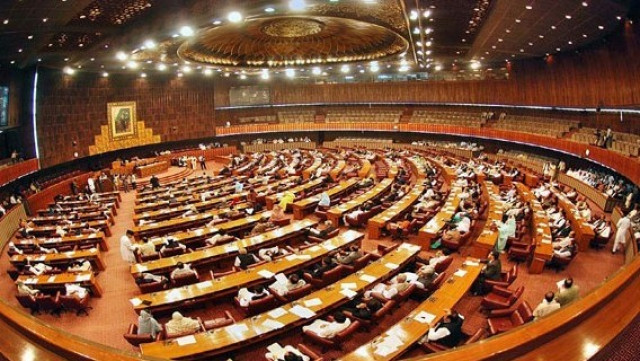NA finance body rejects monetary policy
A parliamentary committee has criticised the State Bank's monetary policy as being far from reality.

NA finance body rejects monetary policy
Chairperson of the national assembly’s standing committee on finance, Fauzia Wahab of the PPP, said the central bank is not accountable to anybody and has framed such a monetary policy which does not reflect ground realities and retards economic growth. “New enterprises are not coming up because of the tight monetary policy,” said Wahab.
The State Bank on July 30 announced its first monetary policy of the current fiscal year in which it increased the benchmark interest rate by 0.5 percentage point to 13 per cent. It attributed the rate hike to increasing inflation.
Independent economists and businessmen have criticised the central bank’s decision. They are of the view that the inflation is not because of excessive demand in the market but was the outcome of heavy borrowing by the federal government from the central bank which is rendering the tight monetary policy ineffective.
Acting Governor of the SBP, Yaseen Anwar, said inflation is a persistent phenomenon. “If interest rates go down the exchange rate stability will be hurt and the rupee will depreciate against the dollar to unimaginable levels.”
He said the decision was taken by the monetary policy committee and unanimously approved by the Central Board of the bank.
Chief Economist of the SBP, Riaz Riazuddin, said the bulk of total credit available in the system was taken away by the government, which was actually hurting economic growth.
He said the reduction in inflation from 25 to 12 per cent was not because of government’s efforts but due to a fall in commodities’ prices in the world market. He said the central bank’s policy only played a partial role in reducing the inflation.
The chief economist said interest rate was increased because the central bank saw certain imbalance in the economy, adding current account deficit, the gap between international receipts and payments, shrank because imports of certain items declined in quantity.
He cautioned that by reducing imports the government cannot ensure sustainable growth and the recent impetus to growth may not be sustained in the medium and long run.
Last year, he said, there was consumption-led growth, which may continue this year as well but it will hardly be sustained in the medium and long run. Riaz said the government spent more than the private sector and that too was not productive.
Published in The Express Tribune, August 4th, 2010.



















COMMENTS
Comments are moderated and generally will be posted if they are on-topic and not abusive.
For more information, please see our Comments FAQ